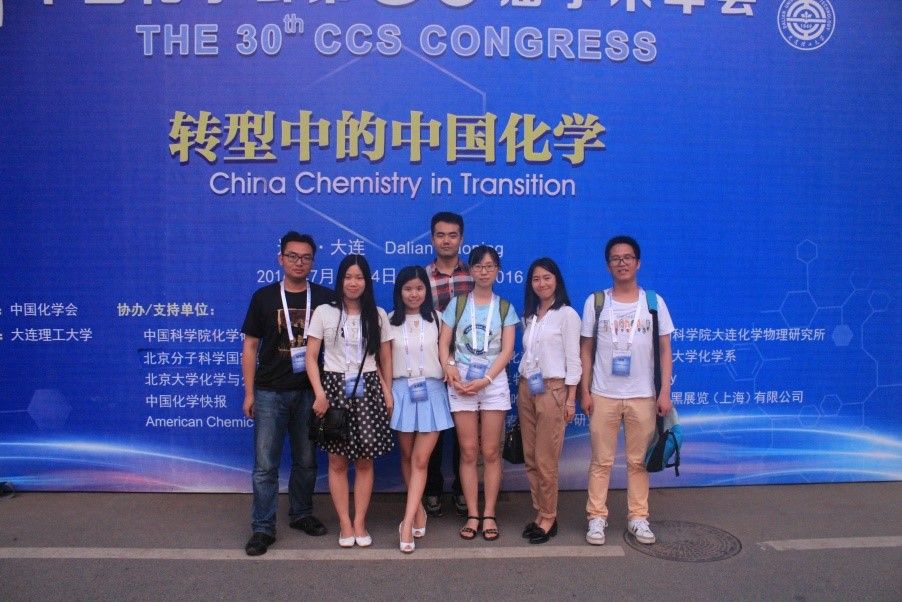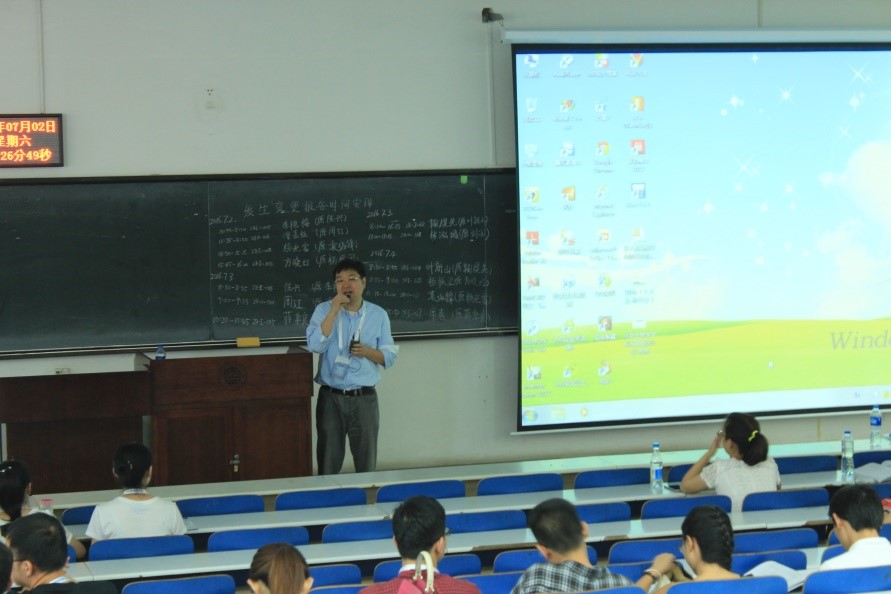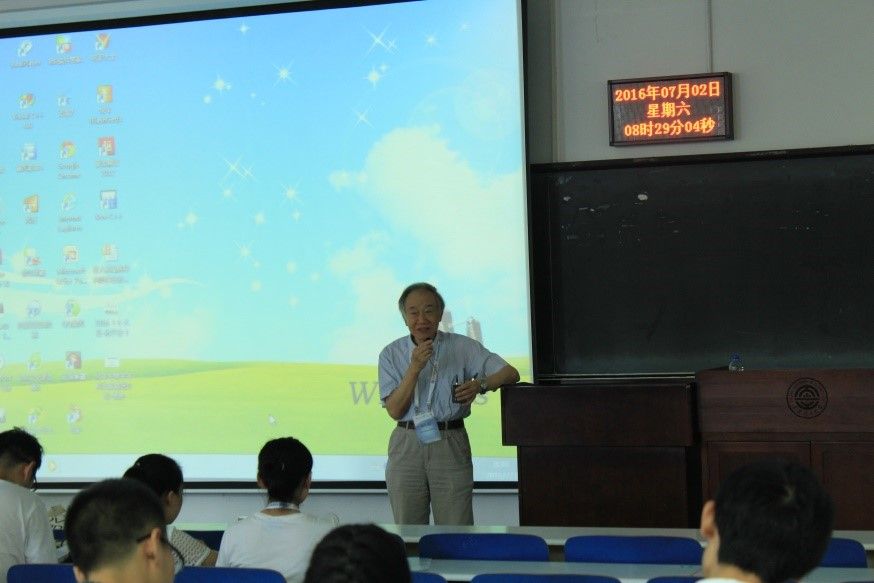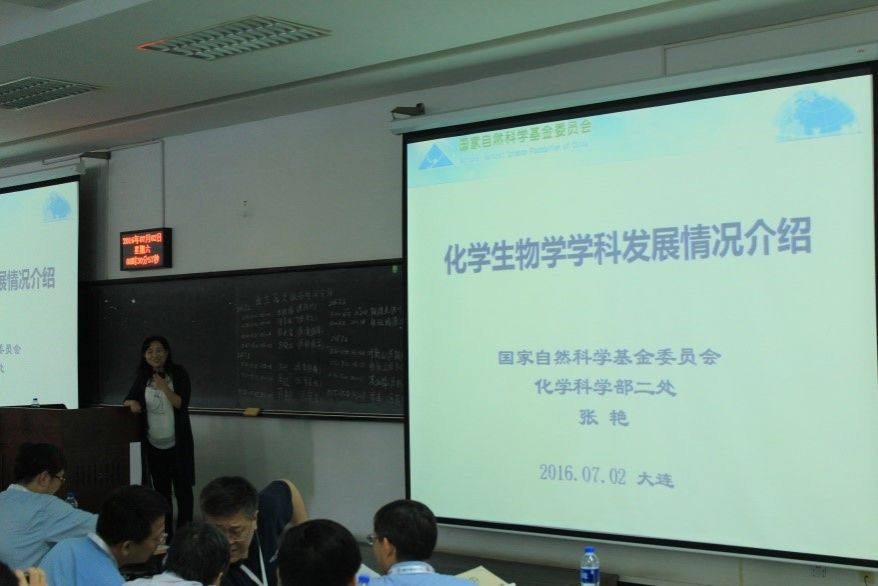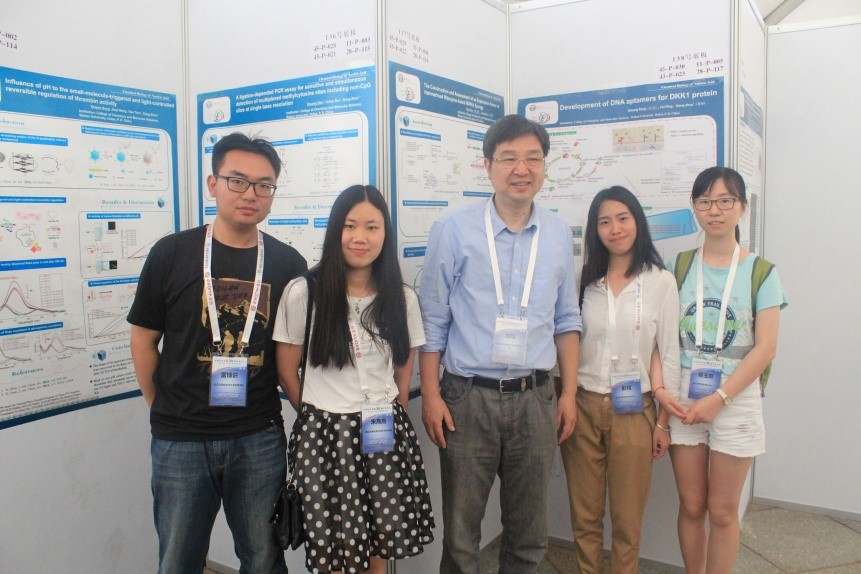From July 1st to 4th, 2016, the 30th annual academic conference of chinese chemical society was held in Dalian, Liaoning. With the theme of "Chemistry in China in Transition", this annual meeting is the largest in scale, with more than 11,000 participants and 7,548 papers exchanged. During the annual meeting, 1,241 invited reports, 1,446 oral reports and 3,969 wall newspaper exhibitions were arranged. Chapter 28: Chemical Biology, with 28 invited lectures, 26 oral lectures and 117 wall newspaper exhibitions. Our research group sent four teachers and seven graduate students' representatives to the meeting. Among them, Mr. Zhou Xiang attended the meeting as the chairman of Chapter 28, and Mr. Tian Song attended the meeting and gave an oral report entitled "Study on G- quadruplex RNA as a new anti-hepatitis C virus target". Seven graduate students' representatives made a wall newspaper to show their research results.
The opening ceremony of Chapter 28 was presided over by Professor Xi Zhen and Professor Zhou Xiang, and Academician Zhang Lihe of Peking University gave the opening speech, warmly welcoming the experts and scholars attending the meeting, and briefly introducing the basic situation of the research in the field of chemical biology to the teachers and students attending the meeting. Then zhangyan, the leader of the Fund Committee, delivered a speech on matters needing attention in applying for the Chemical Biology Fund.
The academic report begins with the report of Academician Zhang Lihe from Peking University on "Innovative Drug Research Based on Chemical Biology". Subsequently, famous young and middle-aged experts from research institutes all over the country made wonderful academic reports one after another. Everyone's thoughts collided with each other in the venue, sparking a spark of wisdom. After every wonderful report, there was a thunderous applause. The innovative drug research proposed by Academician Zhang provides the possibility of targeted therapy and personalized therapy for tumors and other diseases, which is consistent with the definition of chemical biology. Chemical biology is to study the chemical basis of life phenomena and life processes by using chemical theories and methods, and to provide an essential theoretical basis for the discovery of new drugs by exploring ways and mechanisms to intervene and adjust the occurrence and development of diseases. Under the premise of innovative drug research and development, 28 professors invited to report chose different starting points: Ye Xinshan, Li Yanmei, Xi Jianzhong, Liu Gang, Tan Ninghua and others started with the treatment of cancer, and studied the anti-cancer activity of anti-tumor vaccine and miRNA; Professor Li Lu Yuan discovered a new anticancer target. Huang Zhishu, Jiang Zhihong and Professor Xi Zhen have studied other human diseases (such as obesity and myocardial ischemia). Professor Wang Xiaohui is mainly engaged in the research of drug rehabilitation; Professor Hao Xiaojiang is engaged in the research of lysosomes based on chemical biology and develops drugs related to lysosomes. Deng Hongkui, Zhao Zongbao and Professor Liu Wen have studied the ways of small molecules regulating intracellular metabolism. Qu Xiaogang, Yang Zhenjun, Lai Luhua and Professor Yang Caiguang studied the regulation mechanism and its application from the molecular recognition mechanism of nucleic acids and proteins. Yan Xiaomei, Fang Xiaohong, Ju Xianxian, Chen Xing and Professor Chaoyong James Yang have made many achievements in cell single molecule analysis and imaging, starting with chemistry and instrumental analysis respectively. Song Baoan, Yang Guangfu, Yu Xiaoqi and Professor Jiang Hualiang have done a lot of research on green pesticide chemistry, modification of natural products, drug lead compounds and non-viral gene vectors.
Besides the wonderful invitation report, there are many excellent oral reports in Chapter 28. It involves the study of G- quadruplex structure: the study of anti-tumor and anti-hepatitis C virus drugs targeting DNA or RNA, the design of fluorescent probes targeting G- quadruplex, and the study of the interaction mode between G- quadruplex and metal ions; Epigenetic research of nucleic acid and protein, biosynthesis, modification and structure detection of specific amino acids, polypeptides or protein, research on protein-protein interaction and nucleic acid-protein interaction; Design of various fluorescent probes, such as aggregation-induced fluorescent molecular probes for specific gene imaging, fluorescent probes targeting mitochondria, molecular probes targeting sugars, etc. In addition to the research on anti-tumor drugs based on G- quadruplex, there are chiral polyamide anti-tumor drugs, supramolecular self-assembled anti-tumor drugs, natural products FR901464, etc. In addition, this report also studies other human diseases, such as fatty liver, atherosclerosis, Duchenne muscular dystrophy and other diseases.
After listening to a series of wonderful reports, it is not difficult to find the development direction of chemical biology research in the future, continue to engage in the research and development of anti-tumor drugs, and at the same time challenge other diseases that seriously endanger human survival (such as cardiovascular diseases and other rare human genetic diseases), give full play to the advantages of chemistry and solve difficult problems in life sciences. Finally, Professor Zhou Xiang gave a closing speech at the meeting, and the delegates who won the Excellent Wall Newspaper Award took a group photo together as a souvenir. Chen Yuqi, the graduate representative of our group, won the Excellent Wall Newspaper Award.
The conference was a complete success. It deeply discussed the present situation and development trend of chemical biology at home and abroad, analyzed the problems encountered in the development of the discipline, condensed the important development direction of chemical biology in China in the next few years, and greatly promoted the development of chemical biology.
